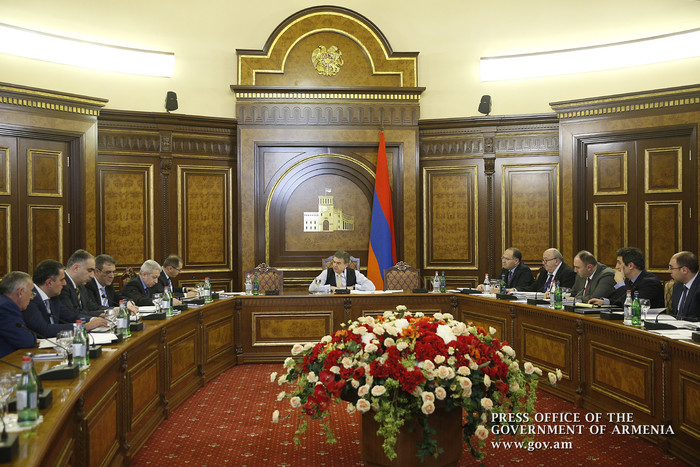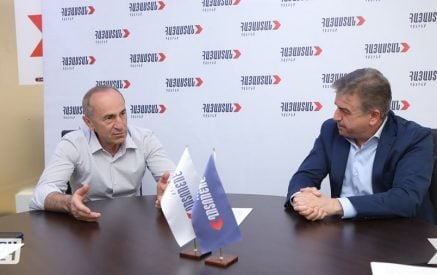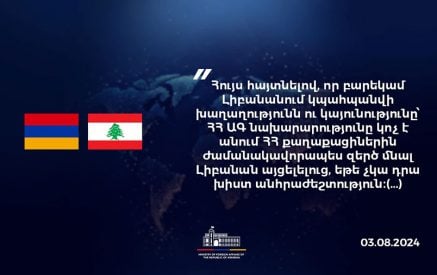Chaired by Prime Minister Karen Karapetyan, the Government continued discussing public agency performance reports for 2016, including their compliance with the government’s action plan, priorities and assessed performance.
Reports were delivered by the Ministry of Diaspora, Ministry of Finance, Ministry of Foreign Affairs, Ministry of Justice and State Revenue Committee.
Referring to the 2016 plan of action and the results of priority tasks, Minister of Diaspora Hranush Hakobyan said that activities continued aimed at addressing housing, education, employment and other issues of those Syria refugees who had moved to Armenia. Measures were implemented to promote knowledge of the Armenian language among young Armenians in the Diaspora. Successfully was implemented the Diaspora Summer School and Come Back Home programs. Accelerated Armenian language courses were organized in 2016.
The Minister noted that all the 2016 projects were dedicated to the 25 anniversaries of the Republic of Armenia and the Republic of Artsakh. My Armenia Pan-Armenian Festival was held, which was unprecedented in the number of participants.
Read also
Hranush Hakobyan also reported on the 2017 priorities. Work was done to address the needs of Syrian and Iraqi refugees, providing support for the Syrian solving the housing problems of vocational training, support for the activities of non-governmental organizations operating in Diaspora Armenians in Armenia and Diaspora teachers and young people for the language of (Western and Eastern) accelerated courses organization and others.
Prime Minister Karapetyan attached importance to the strengthening of ties with the Diaspora, noting, “We should use your platform in order to get a multiplier effect. We need a new culture of management, communication with our compatriots. Through famous and successful Armenians, as potential ambassadors, we have to raise awareness of Armenia and develop management culture.”
***
Minister of Finance Vardan Aramyan reported that in 2016 the revenues of the state budget amounted to 1155.0 billion drams (an increase of 0.7% over the same period last year) less the funds received under targeted programs financed from external sources, while tax revenues and duties stood at AMD 1,079.7 billion, 1.1 percent higher than the same period last year. The fiscal discipline was improved by means of smooth implementation of budgetary expenditures and use of budget “bags.” Additional resources were attracted into the internal market through the issuance of government bonds.
As a result of legislative changes in the field of procurement, there have been reduced the purchasing forms to simplify the conditions for their participation in the organization and procedures. A system of functional and independent court appeal has been developed. The level of transparency and openness of procurement processes was raised, with appropriate mechanisms provided to prevent possible corruption cases. The coverage of electronic ARMEPS / PPCM procurement systems and the scope of customers of the e-procurement system was expanded.
The Minister also presented the 2017 financial year priorities: implement, monitor and coordinate external funding programs from the state budget for implementation of the system in line with plans to create a database of projects planned and coordinated external financing.
Referring to the Ministry’s 2017 activities, the Prime Minister said that the Ministry of Finance should ensure a rough and steep management of financial flows and expenditures. Karen Karapetyan stressed the need to formulate a clear indication regarding the use of loan funds.
“You have developed quite an interesting macro and non-macro analysis. I suggest formulating a clearly defined field to bring the shadow economy into the white field in order to evenly distribute the burden on everyone. There are many problems and red lamps in our statistical analysis of data that tell us where to go, what to do,” Karen Karapetyan said, stressing the importance of holding regular discussions on the platform of the Center for Strategic Initiatives.
***
Chairman of the State Revenue Committee Vardan Harutyunyan noted that technical launch and commissioning of Bagratashen and Gogavan border checkpoints were carried out in the period under review.
Work is underway on the modernization of Bavra checkpoint. The SRC has switched over to the transit declarations subsystem. In order to improve tax administration in the optimization of the structural units of the tax system, 4 resulted in a reduction in the number of tax inspections territorial tax restructuring, instead of the previous 22, will be 20 tax inspection, improved by unregistered work on the detection of hired workers are defined in the legislation, extensively used the documents electronically withdrawal due to cameral studies, implementation and verification of commitments by the system running.
The SRC implemented in terms of taxation (taxable turnover tax) for the purpose of identifying related parties and other activities. The number of tax audits in 2016 decreased by 10 thousand compared to 2015. Preliminary activities were implemented toward introducing the single tax account system, tax authority’s data processing and analysis functions, centralization of implementation, risk assessment based on the monitoring direction.
The following activities were said to be key priorities in 2017: revision of risk management and verification criteria in the electronic automatic control system for selective identification of risky taxpayers, the introduction of information automation systems from third persons, one of the joint account of the introduction of procedural and the implementation of program activities, etc.
Speaking about the objectives of the SRC, the Premier said, “You need to make a breakthrough as to the improvement of the business environment. The first task is to ensure a more favorable treatment for white-listed entities. Second, you should settle your relations with bad taxpayers, not the contrary. Our driving force, our economic growth is just the comfortable feeling of white businesses. I have very high expectations of you: those entities reluctant to accept the rules of the game should feel your breath all the time.”
***
Foreign Minister Edward Nalbandian noted that based on the foreign policy guidelines outlined by President and the assignments and program of the Government of the Republic of Armenia, in 2016 the Ministry continued with the activities aimed at consolidating the foreign security component, achieving favorable external conditions and guarantees for the country’s development, building mutually beneficial cooperation with partner and friendly countries, deepening integration processes in international organizations and associations, increasing the number of Armenia’s friends on different continents, strengthening Armenia’s reputation and position on the international arena.
Efforts were made to develop active cooperation with international and regional economic and financial institutions, protect the interests of Armenian citizens abroad, safeguard cultural heritage, form a positive agenda in international relations and implement initiatives arising from our country’s best interest, coordinate public agencies’ activities in the field of foreign relations.
The Minister reported that in 2017 the Ministry will continue with its efforts aimed at enhancing Armenia’s security, ensuring favorable external conditions, deepening integration in global and regional processes, developing bilateral and multilateral relations with friendly and partner nations, ensuring active participation in the proceedings of international organizations.
Prime Minister Karapetyan asked the Minister to report back progress in the implementation by the ambassadors accredited in foreign countries of his assignments concerning economic activity: “I would like to know whether our ambassadors have full control of information concerning trade turnover, financial flows and investments, and whether they have set themselves the task of presenting specific products to eligible foreign investors.”
The Head of Government tasked the Minister to submit an analytical reference note to the Government Staff on embassies’ economic activity component. The Premier stressed the need to tap the potential of the Armenian Diaspora in terms of trade and investment.
***
Justice Minister Arpine Hovhannisyan reported that the following activities were implemented in the period under review: 150 legal acts were developed, related to the operations of the Ombudsman, political parties, local governments, NGOs, anti-corruption measures and others.
The ministry submitted to the National Assembly draft amendments to the Civil Code of the Republic of Armenia, supposed to harmonize the private legal relationship with modern approaches.
The National Assembly approved the Law on Probation and a related package of laws to ensure that the new Probation Service enforces the types of punishments not related to imprisonment, exercises control over conditional and suspended sentences, as well as carries out re-socialization measures.
The task force for the development of the new Penal Code has worked out a draft code, which is expected to introduce a new system of penalties. The new Criminal Code will help bring the applicable procedures into conformity with the modern requirements.
The Ministry has developed a draft protocol decision of the government on approving the concept of modernization of health services in penitentiaries, the final version of which has already been submitted to the Government Staff, as well as implemented a series of other measures.
Arpine Hovhannisyan noted that as part of 2017 priorities, they will further study and, if necessary, draft new legal acts, providing litigation legal basis for the provision of services electronically, electronically court and creating an electronic court file for the introduction of electronic software, compulsory enforcement system identifying corruption risks and Implementation of reforms aimed at the elimination of these and more.
Prime Minister Karapetyan attached importance to the development and submission of draft legislation on the fight against corruption by the Ministry of Justice, as well as steps aimed at ensuring broader access to services.

























































